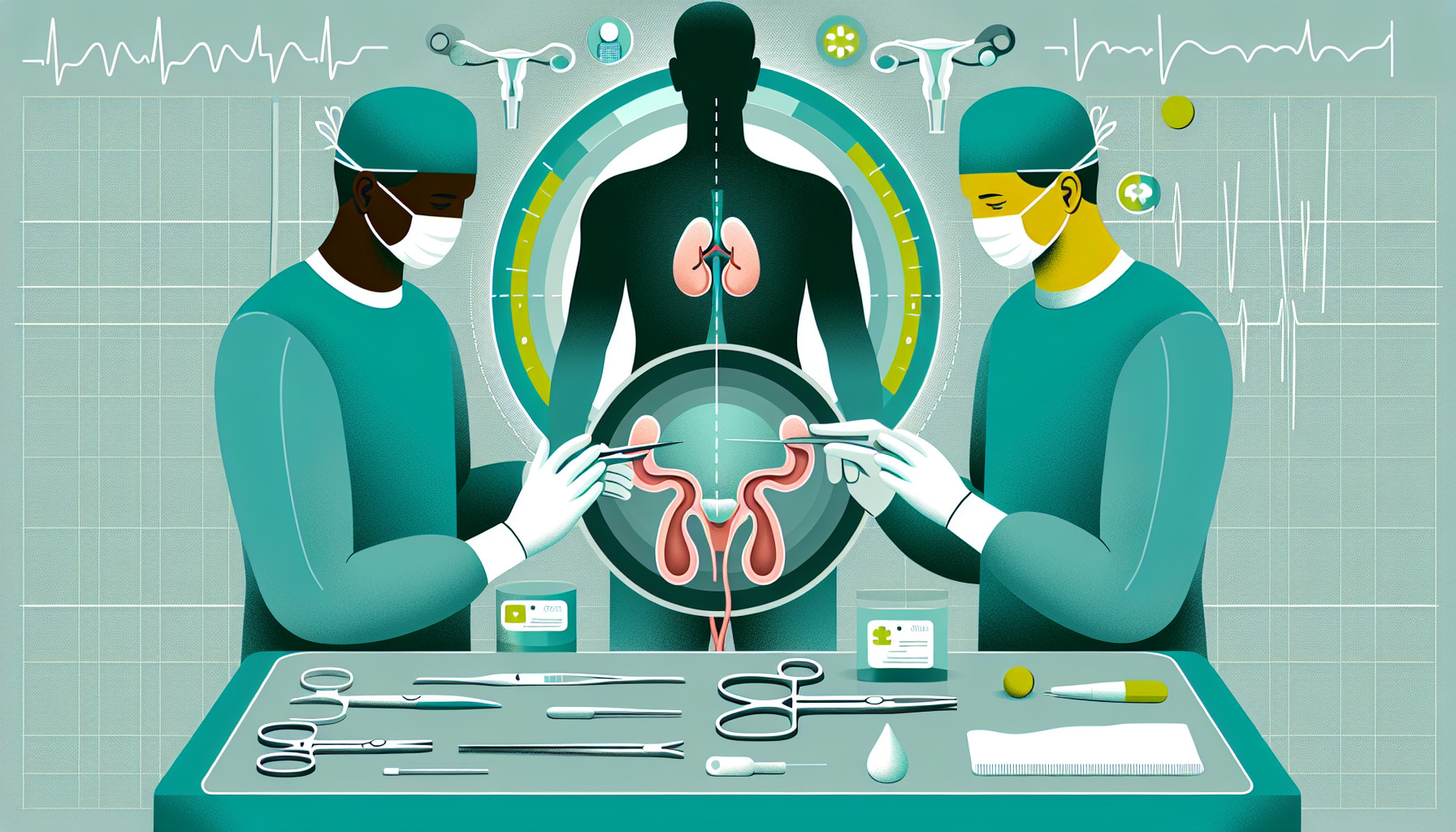Our Summary
This research paper discusses the history, current practices, surgical techniques, and recent findings related to cystectomy, which is the surgical removal of all or part of the urinary bladder. The study found that the risks associated with this surgery for non-cancerous reasons are similar to those when it’s done for cancer. After the surgery, most patients are satisfied with the results and experience good outcomes, including sexual function. They rarely regret the decision if they are well informed about the procedure. The paper also highlights that this surgery is crucial for treating benign diseases as well as for urinary diversion, which is a surgical procedure that changes the normal flow of urine out of the body. Although the risks shortly after the surgery are high, the long-term results are promising. The study suggests the need for more research to guide patients in making decisions, to provide more information on choosing the type of urinary diversion, and to understand how the surgery and the choice of diversion affect the patient’s quality of life in the long run.
FAQs
- What is the purpose of a cystectomy performed for benign indications?
- How does the postoperative patient satisfaction and functional outcomes, including sexual function, fare after a cystectomy?
- What further studies are needed to understand the long-term impact of cystectomy and diversion choice on a patient’s quality of life?
Doctor’s Tip
A helpful tip a doctor might tell a patient about cystectomy is to make sure to thoroughly discuss and understand the potential risks, benefits, and outcomes of the procedure before making a decision. It is important to have open communication with your healthcare team and to ask any questions or voice any concerns you may have. Additionally, following post-operative care instructions and attending follow-up appointments are crucial for a successful recovery.
Suitable For
Patients who are typically recommended cystectomy include those with the following conditions:
Interstitial cystitis: Cystectomy may be recommended for patients with severe and refractory interstitial cystitis who have failed conservative treatments.
Neurogenic bladder: Patients with neurogenic bladder dysfunction due to spinal cord injury, multiple sclerosis, or other neurological conditions may benefit from cystectomy to improve bladder function and quality of life.
Radiation cystitis: Cystectomy may be recommended for patients with severe radiation-induced bladder damage, which can lead to chronic pain, recurrent infections, and hematuria.
Urogenital fistula: Cystectomy may be necessary for patients with complex urogenital fistulas that are not amenable to less invasive treatments.
Overall, cystectomy is a complex surgical procedure that may be recommended for patients with benign conditions that significantly impact their quality of life and are not responsive to other treatments. It is important for patients to discuss the risks and benefits of cystectomy with their healthcare providers to make informed decisions about their treatment options.
Timeline
Before cystectomy:
- Patient experiences symptoms of their underlying benign condition, such as interstitial cystitis, neurogenic bladder, radiation cystitis, or urogenital fistula.
- Patient may undergo various conservative treatments, such as medications, physical therapy, or bladder instillations, to manage their symptoms.
- If conservative treatments are unsuccessful or if the condition worsens, the patient may be recommended for cystectomy.
After cystectomy:
- Patient undergoes cystectomy surgery, which may involve partial or total removal of the bladder.
- Patient may undergo urinary diversion surgery to reroute urine from the body, such as ileal conduit, continent cutaneous reservoir, or neobladder.
- Patient experiences perioperative morbidity, but postoperative satisfaction is generally high.
- Patient may experience improvements in functional outcomes, including sexual function.
- Patient may require ongoing follow-up care and monitoring to ensure long-term success and quality of life.
- Further studies are needed to better inform patient decision-making and understand the long-term impact of surgery and diversion choice on quality of life.
What to Ask Your Doctor
- What are the potential risks and complications associated with cystectomy surgery for my specific condition?
- What is the expected recovery time and post-operative care for cystectomy?
- How will cystectomy affect my bladder function and urinary continence?
- What are the different types of urinary diversion options available after cystectomy, and how do they differ in terms of function and lifestyle implications?
- How will cystectomy impact my sexual function and intimacy?
- What are the long-term outcomes and quality of life implications of undergoing cystectomy for benign indications?
- Are there any alternative treatments or less invasive procedures that I should consider before opting for cystectomy?
- How many cystectomy procedures have you performed, and what is your experience and expertise in this type of surgery?
- Can you provide me with information or resources to help me make an informed decision about cystectomy?
- Are there any specific lifestyle changes or preparations I should make before undergoing cystectomy surgery?
Reference
Authors: Aftreth OP, Tenggardjaja CF, Reyblat P. Journal: Curr Urol Rep. 2022 Sep;23(9):195-201. doi: 10.1007/s11934-022-01100-1. Epub 2022 Sep 3. PMID: 36057019
